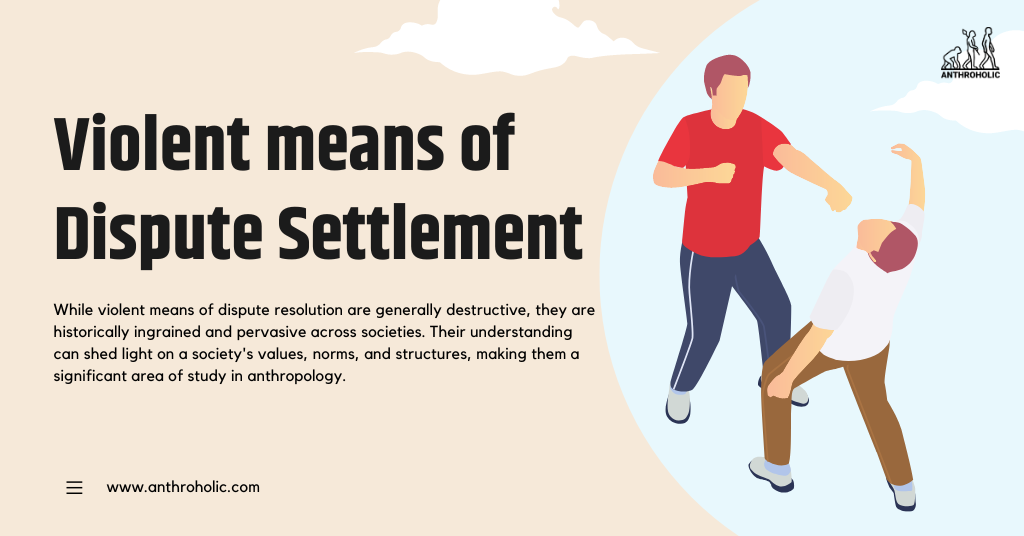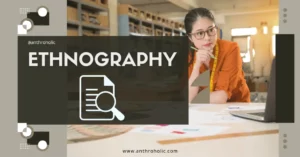AI Answer Evaluation Platform Live Now. Try Free Answer Evaluation Now
Violent means of Dispute Settlement
The complexity and diversity of human interaction give rise to conflicts and disputes, whose resolutions are integral for maintaining societal order and harmony. Among various strategies adopted for dispute resolution, some societies, under certain circumstances, have historically resorted to violent means. This anthropological study delves into the exploration of such conflict resolution methods, encompassing individual violence, feuding, raiding, and large-scale confrontations or warfare. By understanding these violent strategies, we can gain a comprehensive insight into the socio-cultural dynamics that underlie conflict resolution and gain a deeper appreciation for the complexities of human interaction.

Individual Violence
Individual violence, the most basic form of violent dispute resolution, typically involves one-on-one physical conflict between parties in disagreement. This method is prevalent in societies where social order isn’t strictly established or where legal systems lack efficiency.
Examples and Implications
- Honor-based societies (such as the Bedouin tribes of the Middle East) use individual violence to uphold personal honor and social status [1].
- In contemporary urban societies, individual violence, including assault and battery, often arises from personal disputes [2].
Feuding
Feuding involves a series of retaliatory acts between individuals or groups, often spanning generations. Unlike individual violence, feuding is protracted, often not ending until one party is exhausted or eradicated.
Feuding in Different Societies
- Appalachian Mountain feuds of the late 19th and early 20th centuries are notable examples, where feuds like Hatfields vs. McCoys lasted for generations [3].
- Among the Yanomami tribes of South America, violent feuds are a prevalent form of dispute resolution [4].
Raiding
Raiding involves premeditated, surprise attacks on a group or settlement by another group. Raids are primarily conducted to acquire resources, territory, or prestige.
Examples and Consequences
- The Maasai people of East Africa, known for cattle raiding, use it as a means of wealth accumulation and social prestige.
- Vikings, famed for their seaborne raids, significantly impacted European history.
Large Scale Confrontations or Warfare
The most organized form of violent dispute resolution, warfare, involves armed conflict between large groups or nations. Warfare can result from a variety of causes, including territorial disputes, political power, or resource competition.
Case Studies and Impacts
| War | Cause | Outcome |
|---|---|---|
| Peloponnesian War | Political power and influence | Weakened the major Greek city-states |
| World War I | Nationalism, imperialism, militarism | Redefined the global political landscape |
Warfare’s impact is multi-dimensional, affecting societies economically, politically, and socially. It can lead to the establishment of new political orders, changes in societal structures, and shifts in resource allocation.
Conclusion
While violent means of dispute resolution are generally destructive, they are historically ingrained and pervasive across societies. Their understanding can shed light on a society’s values, norms, and structures, making them a significant area of study in anthropology.
References
[1] Rosen, L. (1984). Bargaining for Reality: The Construction of Social Relations in a Muslim Community. University of Chicago Press. https://archive.org/details/bargainingforrea0000rose
[2] Hannerz, U. (1981). The disorder of things: Predicaments in the urban West. Journal of Contemporary Ethnography, 10(1), 53-90.
[3] Rice, O.K. (1982). The Hatfields and the McCoys. University of Kentucky Press.
[4] Chagnon, N. A. (1983). Yanomamö: The fierce people. Holt, Rinehart and Winston.




